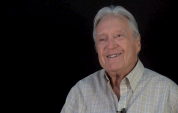3:52 | The new B-17 crew was part of a provisional group that, once in England, would be parceled out to units that needed replacement crews. George Starks was the young Lieutenant in charge of one crew that had been selected as the best of the group. He barely got away from Labrador in a storm and the flight across the Atlantic was the toughest instrument flying he ever did. (This interview made possible with the support of DOROTHY J. D'EWART.)
Keywords : George Starks B-17 Flying Fortress pilot Goose Bay Labrador Scotland Stone England Tom Dexter Atlantic storm

George Starks enlisted as an aviation cadet in 1942 and made his way up the training ladder to B-17's. He got out of an assignment as an instructor in the small trainers because he wanted to fly the big aircraft. He excelled along the way and at nineteen years old, he prepared to go to war as the commander of a ten man crew. (This interview made possible with the support of DOROTHY J. D'EWART.)
On his fifth combat mission, his first as aircraft commander, B-17 pilot George Starks was on the outside edge of the formation when the plane was hit by German fighters. With a wing on fire, he gave the signal to bail out and he was soon in free fall from high altitude over France. He landed hard, hid his chute, and hid in the woods as he heard German troops approaching. Part 1 of 7. (This interview made possible with the support of DOROTHY J. D'EWART.)
After bailing out, evading German troops and hiding in the woods, B-17 Pilot George Starks was helped by French civilians and put on his way over land toward Switzerland. He had a broken bone in his foot, but he managed to make good time, with some help from locals. German troops were everywhere but his young looks and beret gave him a chance when he encountered them. Part 2 of 7. (This interview made possible with the support of DOROTHY J. D'EWART.)
As he made his way through France in disguise, downed B-17 pilot George Starks encountered German troops, stole a bicycle and made friends with many locals. In one town he was sheltered by the chief of police, who had a very friendly daughter. Part 3 of 7. (This interview made possible with the support of DOROTHY J. D'EWART.)
Following his French contact at a discreet distance, George Starks parked his bicycle and watched the man enter a bakery. In the back of that bakery, he met Maurice, a member of the Free French Resistance. He was getting close to Switzerland, but he would need Maurice's help to get over the border. Part 4 of 7. (This interview made possible with the support of DOROTHY J. D'EWART.)
After a long trek across France, George Starks was finally next to the Swiss border. From the time he hid his parachute until the time he stepped across the creek that was the border, he had been helped by sympathetic locals. When he was finally out of occupied territory and free in Switzerland, he was surprised when someone else showed up. Part 5 of 7. (This interview made possible with the support of DOROTHY J. D'EWART.)
George Starks had evaded capture all across France and was safe in Switzerland, where he had it easier than downed airmen who had actually come down in Switzerland. They were supposed to stay put and wait, but he had other ideas, which led to the liberation of Evian on the other side of Lake Geneva. Part 6 of 7. (This interview made possible with the support of DOROTHY J. D'EWART.)
After leaving his safe haven in Switzerland, downed B-17 pilot George Starks finally met up with American forces near Evian in France. Then began a long, sometimes pleasurable trip back to his unit in England. After debriefing, he was sent around to give lectures on evasion for other airmen, then back home to Florida. Part 7 of 7. (This interview made possible with the support of DOROTHY J. D'EWART.)
After an amazing adventure in France and Switzerland, George Starks was instructing B-17 pilots at the war's end. He took a job with an airline, but decided upon another path, one which would lead him back into the army, but not as a pilot. (This interview made possible with the support of DOROTHY J. D'EWART.)
He had been a pilot, but George Starks was now an army dentist. When war broke out in Korea, he had to go, following the action all the way from Inchon up into the north. He was part of the hasty retreat south, as well as the push back northwards after regrouping. (This interview made possible with the support of DOROTHY J. D'EWART.)
He had evaded Nazis in France and followed the action through Korea, but there was one more adversary for George Starks to overcome, the unfairness of army bureaucracy. He had to defeat, or at least outlast, this final obstacle to return home. (This interview made possible with the support of DOROTHY J. D'EWART.)
It was long after his service as an army dentist in Korea that George Starks read an article in the paper about a veteran who described his evacuation and medical care. He was sure he must have done the surgery so he decided to contact him. (This interview made possible with the support of DOROTHY J. D'EWART.)